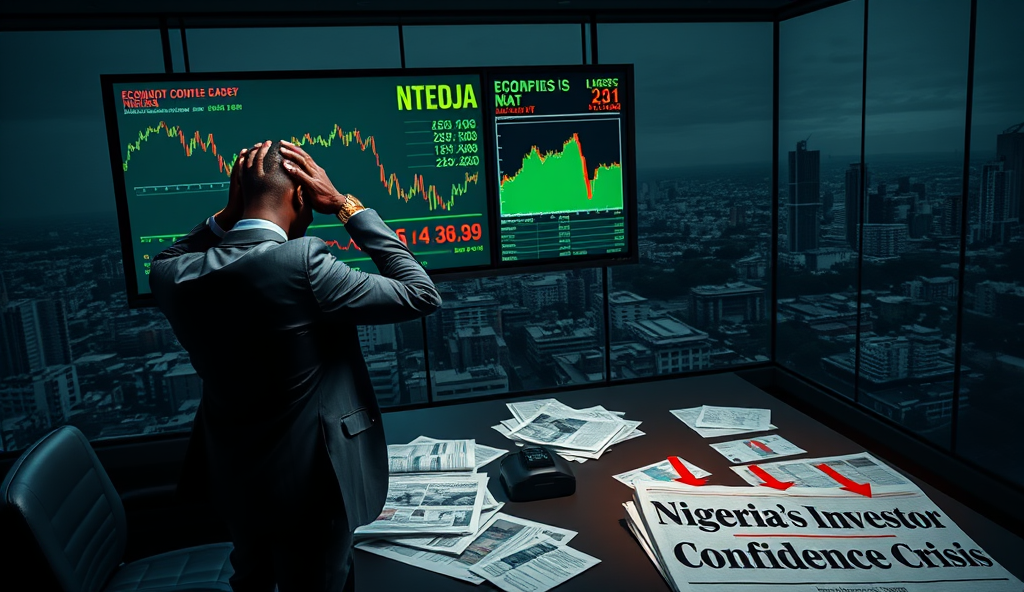Introduction to Nigeria’s Economic Policy and Investor Confidence
Nigeria’s economic policy framework directly shapes foreign direct investment inflows, with recent reforms like the Petroleum Industry Act 2021 demonstrating the government’s attempt to boost investor confidence. However, persistent challenges such as currency volatility and regulatory inconsistencies continue to create uncertainty for international businesses operating in Africa’s largest economy.
The Nigerian Stock Exchange All-Share Index’s 19% decline in 2022 reflects how policy shifts impact market performance, particularly in key sectors like energy and financial services. While initiatives like the Nigerian Investment Promotion Commission’s one-stop shop aim to streamline business processes, implementation gaps often undermine their effectiveness for foreign investors.
As we examine Nigeria’s current economic policies in the next section, it becomes clear that sustained investor confidence requires balancing reform ambitions with practical execution. The interplay between fiscal discipline, monetary stability, and business-friendly regulations remains critical for attracting long-term capital inflows.
Key Statistics

Overview of Nigeria’s Current Economic Policies
Nigeria's economic policy framework directly shapes foreign direct investment inflows with recent reforms like the Petroleum Industry Act 2021 demonstrating the government's attempt to boost investor confidence.
Nigeria’s current policy mix combines fiscal expansion with monetary tightening, as seen in the 2023 Finance Act’s tax incentives and the Central Bank’s aggressive interest rate hikes to 18.75%. The government’s focus on infrastructure spending, including the $2.8 billion Lagos-Calabar railway project, aims to stimulate growth while addressing structural bottlenecks that deter foreign direct investment in Nigeria.
Recent reforms like the Electricity Act 2023, which decentralizes power generation, demonstrate attempts to improve the business climate, though implementation remains uneven across states. The naira’s 40% depreciation following forex market liberalization in June 2023 exemplifies the complex trade-offs between attracting capital inflows and maintaining economic stability that shape investor sentiment.
These policy directions create both opportunities and risks, setting the stage for our examination of key factors influencing investor confidence in Nigeria. The effectiveness of these measures ultimately depends on consistent execution and coordination between monetary and fiscal authorities.
Key Factors Influencing Investor Confidence in Nigeria
The Nigerian Stock Exchange All-Share Index's 19% decline in 2022 reflects how policy shifts impact market performance particularly in key sectors like energy and financial services.
Investor confidence in Nigeria hinges on policy consistency, with the Central Bank’s 18.75% interest rate and forex reforms creating short-term volatility but potential long-term stability if sustained. The Lagos-Calabar railway project exemplifies infrastructure commitments that could boost foreign direct investment in Nigeria, though delayed execution risks eroding trust.
Sector-specific reforms like the Electricity Act 2023 show promise, but uneven state-level implementation creates regulatory uncertainty that dampens private sector confidence in Nigeria. The naira’s 40% depreciation since forex liberalization highlights currency risks, though improved transparency may eventually attract capital inflows.
These intersecting factors—policy coordination, infrastructure delivery, and currency stability—form the foundation for Nigeria’s investment risk assessment. Their evolving dynamics directly shape the impact of fiscal policies on foreign investments, which we examine next.
Impact of Fiscal Policies on Foreign Investments
Nigeria's Central Bank has aggressively raised interest rates by 400 basis points in 2024 to 18.75% aiming to curb inflation but creating mixed signals for foreign investors torn between high yields and currency risks.
Nigeria’s recent tax reforms, including the Finance Act 2023’s revised VAT thresholds, aim to attract foreign direct investment by easing compliance burdens, yet inconsistent enforcement across states creates uncertainty for multinationals. The government’s 2024 budget allocates 30% to capital expenditure—a 5-year high—signaling commitment to infrastructure but raising concerns about debt sustainability given Nigeria’s 38% debt-to-GDP ratio.
Sector-specific incentives like gas export tax holidays have boosted energy investments, with $10 billion pledged since 2022, though delayed implementation of the Petroleum Industry Act continues to deter upstream oil investors. Fiscal deficits exceeding 5% of GDP since 2020 pressure foreign reserves, compounding currency risks highlighted in earlier forex liberalization impacts.
These fiscal measures intersect with monetary policies—particularly interest rate adjustments—which we examine next for their role in shaping investor sentiment amid Nigeria’s economic reforms. The balance between stimulus spending and macroeconomic stability remains pivotal for sustaining capital inflows.
Role of Monetary Policies in Shaping Investor Sentiment
Flutterwave's $250 million Series D funding in 2022 exemplifies fintech success achieving unicorn status by leveraging Nigeria's underbanked population and mobile penetration.
Nigeria’s Central Bank has aggressively raised interest rates by 400 basis points in 2024 to 18.75%, aiming to curb inflation but creating mixed signals for foreign investors torn between high yields and currency risks. The policy divergence with developed markets has attracted portfolio inflows, yet the parallel exchange rate gap exceeding 30% undermines confidence in monetary stability.
Sector-specific credit interventions like the 65% loan-to-deposit ratio for manufacturing have boosted local production, but tight liquidity conditions have simultaneously raised corporate borrowing costs by 5 percentage points since 2022. This dual effect complicates investment decisions, particularly for multinationals balancing Nigeria’s growth potential against financial constraints.
These monetary measures directly impact Nigeria’s stock market performance, where foreign portfolio participation dropped to 18% of trades in Q1 2024 from 54% pre-pandemic, reflecting lingering forex concerns. Such capital flow volatility underscores how monetary policy effectiveness remains tied to regulatory reforms, which we examine next regarding investor trust in government frameworks.
Government Regulations and Their Effect on Investor Trust
Nigeria's investor confidence hinges on sustained policy reforms particularly in forex management and sector-specific regulations as seen in the Central Bank's recent exchange rate unification.
Nigeria’s regulatory environment remains a critical factor for investor trust, with inconsistent policy implementation creating uncertainty despite recent reforms like the Companies and Allied Matters Act (CAMA) 2020. Foreign direct investment in Nigeria dropped 32% in 2023 partly due to abrupt regulatory changes, such as the sudden FX restrictions on 43 imported items which disrupted supply chains.
The Securities and Exchange Commission’s new capital market rules have improved transparency, yet overlapping mandates between agencies like FIRS and state tax authorities still raise compliance costs by 15-20% for businesses. Such friction undermines Nigeria’s investment risk assessment, particularly when combined with delayed approvals for sectors like mining where license processing takes 9 months versus Ghana’s 3 months.
These regulatory gaps amplify the challenges facing investors in Nigeria’s economic landscape, where policy unpredictability often outweighs market potential. The next section examines how infrastructure deficits and bureaucratic hurdles further compound these investment barriers.
Challenges Facing Investors in Nigeria’s Economic Landscape
Beyond regulatory unpredictability, Nigeria’s infrastructure deficits significantly raise operational costs, with businesses spending 40% more on alternative power solutions due to grid instability. Poor road networks also inflate logistics expenses by 25-30%, particularly for manufacturers moving goods from Lagos to northern states.
Bureaucratic bottlenecks further deter foreign direct investment in Nigeria, as evidenced by the 6-month average wait time for construction permits compared to South Africa’s 30-day benchmark. Multiple taxation layers and sudden policy shifts, like the 2023 import prohibition list expansion, create recurring compliance headaches for investors.
These systemic challenges compound Nigeria’s investment risk assessment, though certain sectors like fintech and renewable energy show resilience. The next section explores how strategic opportunities still exist despite these persistent economic headwinds.
Opportunities for Foreign Investors Despite Economic Challenges
Nigeria’s resilient fintech sector attracted $1.2 billion in foreign direct investment between 2020-2023, demonstrating high-growth potential despite infrastructure gaps. Renewable energy projects also offer lucrative returns, with solar investments yielding 15-20% IRR due to rising demand and government incentives like tax holidays.
The consumer goods sector benefits from Nigeria’s 220 million population, with food processing companies recording 12% annual growth despite logistical hurdles. Strategic partnerships with local firms can mitigate bureaucratic delays, as seen in the manufacturing sector’s 8% expansion in 2023.
These opportunities highlight how targeted investments can thrive within Nigeria’s complex business climate, setting the stage for real-world success stories explored next.
Case Studies of Successful Investments in Nigeria
Flutterwave’s $250 million Series D funding in 2022 exemplifies fintech success, achieving unicorn status by leveraging Nigeria’s underbanked population and mobile penetration. Similarly, Arnergy’s solar solutions attracted $9 million in 2023, capitalizing on renewable energy demand and government incentives discussed earlier.
Dangote Group’s $2.5 billion fertilizer plant demonstrates manufacturing resilience, overcoming logistical hurdles through vertical integration and local partnerships. These cases validate how strategic approaches mitigate Nigeria’s complex business environment while delivering strong returns.
Such successes set the stage for analyzing how Nigeria’s evolving economic policies further shape investor confidence, a critical consideration explored next. Each example underscores sector-specific strategies that align with the country’s unique growth drivers.
Expert Opinions on Nigeria’s Economic Policy and Investor Confidence
Economists highlight Nigeria’s inconsistent forex policies as a key deterrent, with foreign direct investment dropping 32% in 2023 despite sector-specific successes like Flutterwave’s fintech boom. The Central Bank’s recent unification of exchange rates has drawn cautious optimism, though experts warn implementation risks could dampen investor trust if not sustained.
Industry leaders cite Dangote’s manufacturing wins as proof that targeted policy adjustments—like import substitution incentives—can boost confidence despite macroeconomic challenges. However, analysts note Nigeria’s stock market underperformance (NGSE -8% YTD) reflects lingering concerns over regulatory unpredictability in critical sectors like energy and telecoms.
These mixed signals set the stage for evaluating Nigeria’s future investor appeal, particularly as new reforms attempt to balance short-term stabilization with long-term growth commitments. The coming year’s policy consistency will likely determine whether recent successes become trends or outliers.
Future Outlook for Investor Confidence in Nigeria
Nigeria’s investor confidence hinges on sustained policy reforms, particularly in forex management and sector-specific regulations, as seen in the Central Bank’s recent exchange rate unification. While the NGSE’s -8% YTD performance reflects skepticism, targeted incentives like those boosting Dangote’s manufacturing could signal a turnaround if expanded to energy and telecoms.
The 32% FDI drop in 2023 underscores the urgency for regulatory predictability, though Flutterwave’s fintech success proves niche opportunities persist despite macroeconomic headwinds. Analysts suggest that consistent implementation of reforms over the next 12–18 months will determine whether Nigeria regains its appeal as a top African investment destination.
As the government balances short-term stabilization with long-term growth, investor trust will likely rebound only if policies demonstrate tangible results, such as reduced import bottlenecks and improved stock market liquidity. These measures could bridge the gap between Nigeria’s potential and its current risk perception among foreign investors.
Conclusion: Balancing Economic Policy and Investor Confidence in Nigeria
Nigeria’s economic policy reforms, from forex unification to subsidy removals, present both challenges and opportunities for foreign direct investment in Nigeria. While these measures aim for long-term stability, short-term volatility in the stock market performance in Nigeria has tested investor patience, with the NGX All-Share Index fluctuating 8.7% year-to-date.
The government must carefully calibrate policy adjustments with investor communication, as seen in the mixed reactions to the 2023 Finance Act’s tax incentives. Private sector confidence in Nigeria improved slightly after the Act’s implementation, yet capital market growth remains constrained by lingering concerns over naira fluctuations and regulatory consistency.
Moving forward, Nigeria’s investment risk assessment hinges on maintaining this delicate balance between necessary reforms and measurable stability indicators. The upcoming section will explore how comparative regional analysis might inform Nigeria’s path toward rebuilding investor trust through policy coherence and transparent implementation.
Frequently Asked Questions
How reliable are Nigeria's recent economic reforms for long-term foreign direct investment?
While reforms like the Petroleum Industry Act show promise, investors should monitor implementation through tools like the Nigerian Investment Promotion Commission's tracker for concrete progress.
What practical steps can mitigate currency risks when investing in Nigeria's stock market?
Hedge forex exposure using forward contracts and diversify across sectors with dollar-denominated revenues like telecoms and export-focused industries.
How can foreign investors navigate Nigeria's complex regulatory environment effectively?
Engage local legal partners and utilize the NIPC one-stop shop portal to streamline licensing and compliance processes.
Which sectors currently offer the best risk-adjusted returns despite Nigeria's infrastructure challenges?
Fintech and renewable energy sectors deliver strong returns—leverage government incentives and partner with established local players like Flutterwave for market entry.
What indicators should investors watch to gauge improvements in Nigeria's policy consistency?
Track monthly Central Bank forex reserves data and quarterly NGX All-Share Index performance as key confidence barometers.


